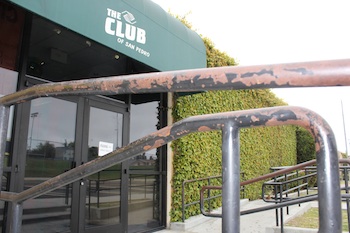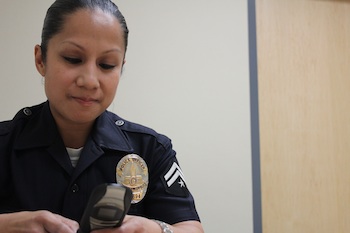Police-Teen Advisory Board Bridges The Gap In L.A.

“Hello?” a groggy voice answers when I call on a recent Tuesday.
“I’m, uh, standing on your porch,” I say. The spitting mist has just turned into a steady rain outside the suburban Sacramento house, and I’d like to be indoors.
“Oh, for real? Hang on.” The line goes dead. A moment later, Isaiah opens his front door. He’s wearing a white undershirt and his head is wrapped up—a far cry from the suit and tie he wore when we first met at Councilman Joe Buscaino’s inauguration party in February. But as soon as he smiles to welcome me in, he becomes the same charming, eloquent kid who stood behind the podium to boast about his mentor, Papa Joe.
Isaiah says the nickname may very well have come from their first encounter in 2005 at the Boys and Girls Club of San Pedro. That’s when former senior lead officer Buscaino and his supervisor, Sgt. Catherine Plows, showed up to rally interest in a new idea they wanted to try.
As Plows told it, the inception of the Teen Community Police Advisory Board, or Teen CPAB, stemmed from Buscaino’s hope to break down barriers between police and local youth. “Joe came to me,” she recalled, “and said, ‘Hey Sarge, don’t you think it’d be great if we could have a teen CPAB?’ And I said, ‘Well, Joe, that’s a really good idea.’”
The station already had a model in place for getting input from adults. “We develop plans with the community on a regular basis—you know, what’s bothering your neighborhood, what quality of life issues are concerning you,” she said when we met earlier this month at Harbor Division. “The only people we weren’t hearing from was the kids.”
So Plows and Buscaino set out to create a sounding board for officers and teenagers around the community, a group that would meet every two weeks or so to talk out problems and identify opportunities for civic engagement. They would eventually find a core set of members—co-chairs, a secretary and treasurer—to lead the group of about 15 kids at each meeting. Besides community issues, kids would also get time to ask officers about themselves—to see the people behind the badge.
First though, they would have to get teenagers to hear them out.
“They had boxes and boxes of pizza—you can always get kids to come if you got free food,” Isaiah says, remembering the day Plows and Buscaino pitched the idea. “Papa Joe was just speaking about having kids work together with the police officers, give us a voice. Supposed to be something real new, something fresh, something different. Seems pretty cool, you know?”
He says it appealed to his interests in community involvement. “I like to be in charge, I guess. And I like to have my ideas used. And Joe, he was just head of it all—he made it happen with those boxes of pizza,” Isaiah says, before adding with a grin, “If he hadn’t had pizza, I don’t know if I would have been there.”
There was no free food at the next meeting. There were, however, elections for positions on the board. Isaiah gave a short stump speech and quickly became co-chair. Before long, he was meeting regularly with officers, traveling with Plows and Buscaino to cities as far away as Atlanta for police conferences.

At first, Isaiah says, he was a little wary of his new surroundings. “It’s like, yo, this is a lot of officers, a lot of handcuffs around me,” he says, “a lot of badges and batons.” Before getting involved with Teen CPAB, Isaiah’s impression of the police was probably milder than for some his age. “My idea wasn’t so much that the police were bad, the police were mean—I just knew that the police did stuff that people didn’t like,” he says.
“I did know the risk—you know, with all the stories out there and me being a young black man. You just never know. You could be the next story.”
Because of that perception, Isaiah says some of his friends were suspicious of the collaboration. “A lot of the people I worked with were like, ‘You work with the police? You a narc, you’re a this, you’re a that,’” he says, twisting his face into a sneer. “But I’d tell them, at the end of the day, no matter if it’s a police officer or the president, a person is a person and a human is a human.
“They’re taking care of us and you have faith in them,” he continues, “because when you call 911, you want a police officer to come. So it’s like, why not build that relationship so that phone call can go smoother?”
Isaiah said that understanding helped him develop a close bond with his Teen CPAB officers. After spending so much time together, Plows and Buscaino in particular began to play bigger roles in Isaiah’s life. When he got his first job at a movie theater, they even chipped in to buy him a car—a bright red 1994 Honda Civic EX—so he could get to work on time each day.
“They didn’t have to give me the opportunity to be head of something that could really help our generation. They didn’t have to do any of that,” Isaiah says. “But they did, and they were genuine through the whole process. We were like a family.”
That bond has stayed strong even as Isaiah has struggled to make use of the college opportunities Teen CPAB afforded him. He started out attending Sacramento State University on scholarship, but had to drop out after a rough year in 2010. It was hard for the then-18-year-old to stay on track without the support system he’d found in Teen CPAB.
But his mentors didn’t lose faith in him. “Papa Joe’s always telling me, stay focused,” Isaiah says. “He has a real accurate grip on what it takes to be successful. That’s the type of motivation that really helps, especially when it’s not just coming from your mother. It makes you feel like there’s actually something about me that I can use.”
Isaiah is upfront about the effect his homelife has had on his extracurricular activities. “I don’t have a father, so I always want a male mentor. Just having Papa Joe and Sgt. Plows motivate me every time I go back home, it feels so good,” he says.
Those visits usually include some well-meaning prodding. “Going to the station, seeing Papa Joe, Seeing Sgt. Plows, I always hear, ‘How’s school? Graduating? You better graduate.’ It’s like yeah, let me make sure I get that,” For now, Isaiah is taking classes at Sacramento City College, a nearby community college. He plans to re-enroll at Sacramento State as soon as possible.
He credits Teen CPAB with helping him develop some key life skills he’ll use on his way to a career in either politics or marketing management. “It was like full-blown. I was able to travel, I was able to network, I was able to be a part of decisions and ideas that really came to life. It wasn’t just talk,” he says. “We really did stuff. It was real cool to be a part of something like that.”
Listening Is Key
Almost seven years later, the model appears to still be working.
Current Co-chair Kavita Desai is every bit as motivated as her predecessor when it comes to civic engagement. “Well personally, I have a hard life at home—my parents don’t really let me hang out with friends during the weekends,” she said. “Being involved in my community allows my parents to know that I’m safe and that I’m doing a good job. They motivate me to continue doing so.
“It’s more like I formed a family within these community organizations. They just really touched my heart.”
When asked what kind of tools she’s already gotten out of her three years with the program, Kavita’s voice climbed upward in a familiar teenaged lilt. “Like, leadership skills?” she said. “I’ve noticed in school that it’s really hard for kids to get involved with their communities. They lean toward the more negative side of growing up as a teenager. I think programs like these allow my peers to be involved in positive environments and grow from them.”

“I think it’s contagious,” she said. “I think that once people learn that they make a positive impact in the community, there’s no turning back. I think that people will always try to give back. That’s the seed we want to plant.”
The officers behind Teen CPAB have tried to find constructive ways to nourish that seed. One creative project they've come up with is the board’s annual Public Service Announcement campaign. Each year, youth members pick a community issue they’re most concerned about and produce a short film spot to reach their peers. In the past, targeted issues have included curfew and truancy. This year, the board is working on promoting responsible skateboarding in light of the recent deaths of two San Pedro teens who were riding unsafely.
“We just thought we should address how severe or how important it is to wear helmets and be safe on streets and stuff,” Kavita said, shifting in her seat.
The project is still in the planning phase. “It shouldn’t take them that long,” Garcenila said. “I asked them to think of a commercial they thought was impactful, why they felt it made an impression of them. Is it the music, is it a visual impact? Is it what’s being said or who’s speaking to you? So I said, think about all those things and put them together. Then think about whether you’d watch that and if it would make a difference to you. That’s your springboard.”
Advice From Isaiah
It’s the kind of inspiring guidance over heavy-handed supervision that characterized Teen CPAB from the start—a tradition Isaiah will be happy to hear is still in place.
“I just hope wherever the program is now that it’s still that vibe—that the officers or whoever’s in charge have the same passion that Papa Joe and Sgt. Plows had in it to be really genuine,” he says. “Because the kids, they can smell it if an adult is just playing a role.”
Sgt. Plows said teens are still the priority. “It’s the kids, the kids that are there that need a voice. They need to hear, they need to be heard, they need to speak. So what better way for us as adults to recognize what’s going on in our communities than by asking?” she said. “But then listening.”
Inside the Sacramento house he shares with a few other students, Isaiah sits forward in his chair, clearly still passionate about the program that spoke to him as a 16-year-old. In simple words, he sums up the secret behind sustaining Teen CPAB’s success.
“If you’re going to empower youth, then empower them.”
See more from an interview with Sgt. Catherine Plows below.
Reach Deputy News Editor Catherine Green here; follow her here.



